AUTHOR OF THE REPORT: ASSOCIATION OF INDEPENDENT PRESS OF MOLDOVA
PHOTO: Aggression against journalist Viorica Tataru during the coverage of the protest on March 12, 2023
1/ KEY FINDINGS
In the Republic of Moldova, 43 cases of attacks/threats against professional and citizen media workers and editorial offices of both traditional and online publications were identified and analysed in the course of the research for 2023. Over the last three years, the number of attacks on journalists in Moldova has decreased, with 68 cases documented in 2021 (the same as in 2020) and 56 cases in 2022. Data for the study were collected using open-source content analysis in Romanian, Russian and English. A list of the main sources is presented in Annex 1.
- The vast majority of cases (33, or 77% of the total number) were non-physical and/or cyber-attacks and threats. As of 2017, these types of attacks remain the main method of pressure on media workers in Moldova.
- In contrast to previous years, when the main perpetrators of non-physical attacks/threats against media workers were government officials, in 2023 most attacks (16 cases, 48% of the total) were perpetrated by unknown individuals. These attacks were mostly online attacks from fake profiles and accounts. Further attacks were perpetrated by individuals not representing the authorities, including participants in anti-government protests.
- All three physical attacks and threats to the life, liberty and health of media workers took place during protests organised by the political party “Shor”, which was declared unconstitutional by the Constitutional Court of the Republic of Moldova in June 2023.
- The number of attacks on media workers and editorial offices via judicial and/or economic means has decreased slightly compared to 2022 (from ten to seven incidents) and mainly consisted of civil lawsuits brought by the subjects of journalistic investigations about corruption.
- In 2023, several journalists and the chairwoman of the Moldovan Broadcast Council were declared “undesirable” persons in the Russian Federation, and a journalist was banned from entering the Transnistrian region, which is not under the control of the Moldovan authorities.
It should be noted that some attacks and threats are not publicly reported and, therefore, do not receive media coverage, as many journalists consider cyber-attacks and non-physical threats to be an unavoidable part of their daily work.
2/ THE POLITICAL SITUATION AND THE MEDIA IN MOLDOVA
In 2023, the Republic of Moldova ranked 28th out of 180 countries in the world in the annual press freedom rating by “Reporters Without Borders”, significantly improving its position compared to the previous year, when it was ranked 40th. This is the best result in the country’s history, and over the past five years, Moldova has become a leader in press freedom among the Eastern Partnership countries. Ilan Shor, a fugitive pro-Kremlin oligarch, who was sentenced in Moldova to 15 years in prison for his involvement in a bank fraud referred to as the “billion-dollar bank theft ” and included on a number of international sanctions lists, still funds several media platforms that aim to destabilise the Republic of Moldova.
According to data from the Broadcast Council (the national regulatory authority in this field), as of 31 December 2023, there were 53 television service providers operating in the Republic of Moldova with 57 broadcast licences, and 56 radio service providers with 61 broadcast licences. Compared to the previous year, the number of television service providers has decreased, mainly due to economic challenges, including insufficient advertising revenue.
According to the Barometer of Public Opinion from September 2023, a survey conducted by the Centre for Social Studies and Marketing, “CBS-Research”, and the Institute for Public Policy – 76% of Moldovan citizens use the Internet every day, 57% watch TV daily, 29% listen to the radio, 11% read books, and 5% of citizens read newspapers daily. For 30% of respondents, their primary source of information is television, and for 54% – the Internet. Over 41% of respondents have “some trust” or “a lot of trust” in the media in Moldova. The Internet and TV are the most valued sources of information – trusted by 39% and 20% of respondents respectively. Compared to previous years, there was an increase in the share of citizens who get their information online (including from websites and social media) and trust these sources and, conversely, a decrease in the number of Moldovans who trust (and get their information from) traditional media such as TV, radio and newspapers.
The ruling party of the Republic of Moldova – the “Action and Solidarity” Party promotes reforms and European integration of the country. In 2023, several laws and decisions were adopted to strengthen the media in the country. In 2023, the new Law on Publicity (passed in 2022) entered into effect; the National Media Development Program for 2023-2026 was approved; and a new Law on Access to Public Interest Information was passed. For the first time, a central authority (the Ministry of Culture) was designated to coordinate public policy in the media sphere.
Following the state of emergency declared in Moldova after the beginning of Russia’s full-scale invasion of Ukraine (later prolonged several times by parliamentary decisions), the Commission for Emergency Situations and the Intelligence and Security Service took steps to protect the Republic of Moldova from malicious propaganda influences. As a result, in 2023, the broadcast licences of six TV stations were suspended (in December 2022, the licences of six other TV stations had been suspended), and several websites promoting war and hatred, and justifying Russia’s military actions in Ukraine were blocked.
3/ GENERAL ANALYSIS OF ATTACKS
In 2023, 43 attacks against media workers were reported, 13 fewer than in 2022. In recent years there has been a downward trend in the number of attacks against media workers.
Of the total number of attacks, 33 (77%) were non-physical and/or cyber-attacks and threats; in seven cases the media outlets and journalists were targeted via legal and/or economic means; 3 physical attacks and threats to the life, liberty and health of media workers were reported, which is the lowest number since the beginning of monitoring since 2017.
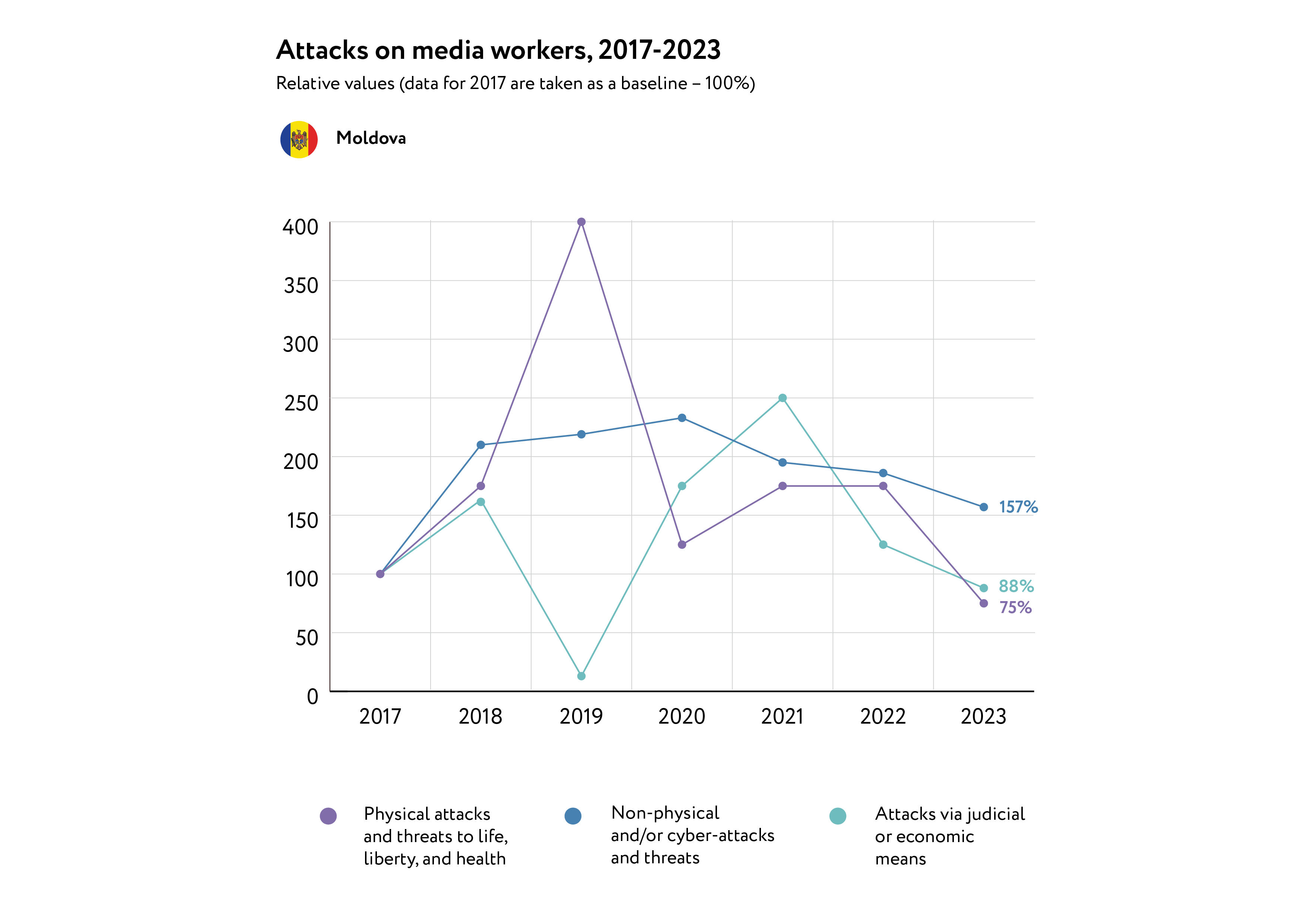
The main perpetrators of attacks against media workers in 2023 were:
- Unknown individuals using false identities who defamed, intimidated and threatened journalists with death and physical assault on social media (17 cases).
- Individuals and representatives/supporters of opposition political groups (13 cases).
- Representatives of the authorities at the regional level (8 cases).
- The authorities of the Russian Federation or the unrecognised administration in the Transnistrian region (4 cases).
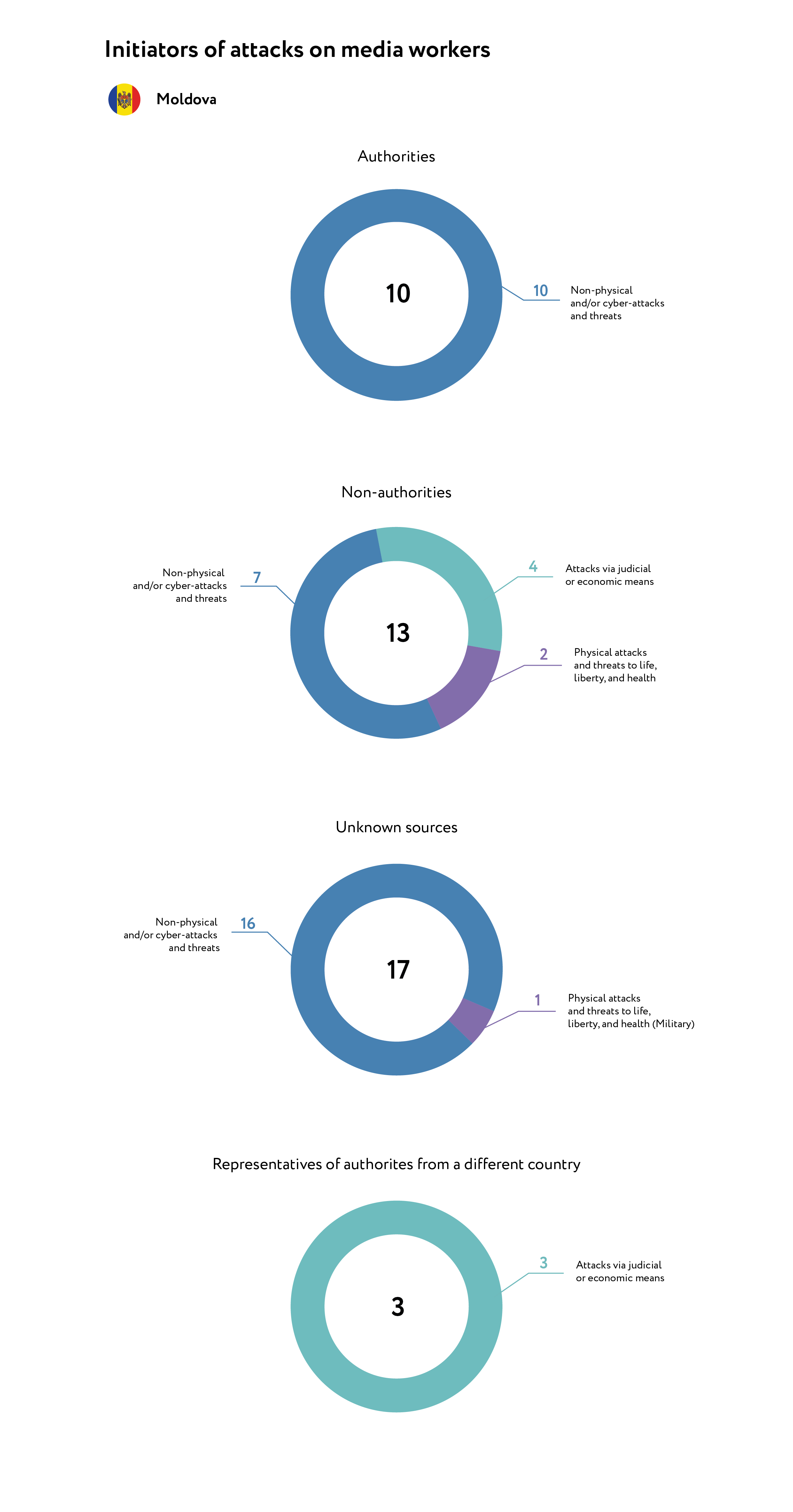
In 2023, 19 media outlets and organisations in Moldova were attacked or threatened. The most frequent targets were:
- Employees of the Nokta.md portal in Comrat (Gagauzia Autonomous Region) (nine cases) and the TV8/portal or Tv8.md (eight cases).
- The investigative publication Ziarul de Gardă (five attacks) and Jurnal (three attacks).
The following portals also reported being attacked: Newsmaker.md, Ialovenionline.md, Zonadesecuritate.md, The Center for Investigative Journalism, CU SENS Media Project, Tuk.md (Taraclia), Nordnews.md (Balti), Free Radio Europe station, Elita TV (Rezina), and other media outlets.
4/ PHYSICAL ATTACKS AND THREATS TO LIFE, LIBERTY AND HEALTH
In 2023, just three cases of physical attacks and threats to the life, liberty and health were reported. This is a decrease compared to 2021, when seven incidents were recorded. The number of physical attacks against media workers recorded in 2023 is the lowest since 2017.
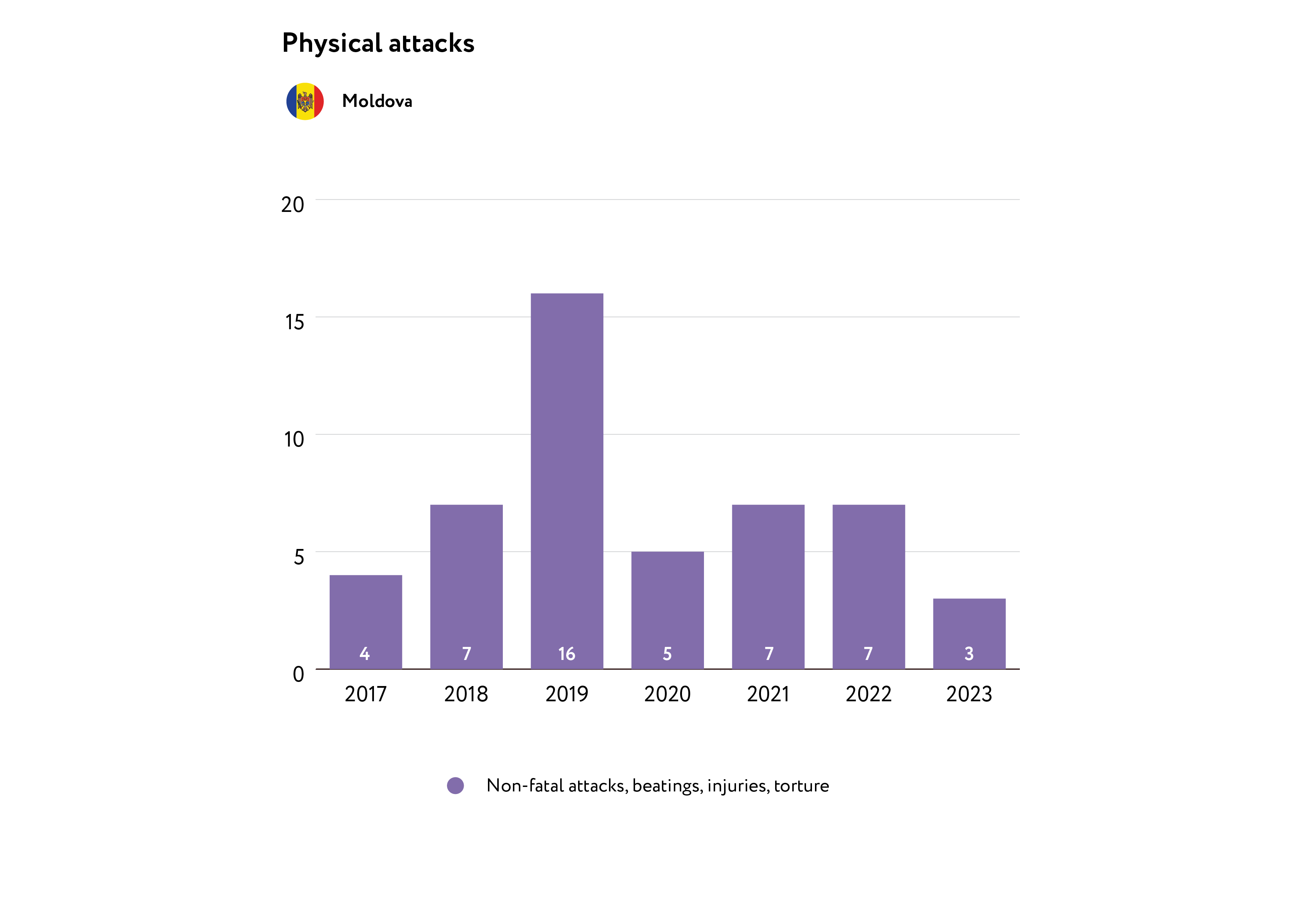
In 2023, all incidents of this nature took place during anti-government protests organised by the “Shor” party and were provoked by demonstrators who took umbrage with being asked questions and filmed by journalists. These incidents include:
- On 28 February 2023, residents of the town of Cupcini in the Edineț district, who were taken on an organised trip to participate in the “Shor” party protest, expressed their displeasure at being filmed, and were aggressive towards journalists from the Nordnews.md portal, with one of the men hitting journalist Nicolai Coșeru.
- On 14 March 2023, Nadejda Roscovanu, a photojournalist for Jurnal.md, was verbally abused and physically assaulted by several elderly people at a protest organised by the “Shor” party in the centre of Chișinău. The demonstrators were angry about being filmed without permission, despite being in the public park.
- On 7 May 2023, Newsmaker.md journalist Denis Borșevici was struck by an object thrown by one of the demonstrators participating in the protests organised by the “Shor” party.
5/ NON-PHYSICAL AND/OR CYBER-ATTACKS AND THREATS
Non-physical and/or cyber-attacks and threats remained the most common method of exerting pressure on media workers in Moldova. In 2023, 33 non-physical attacks and threats were reported (77% of the total number of all reported incidents).
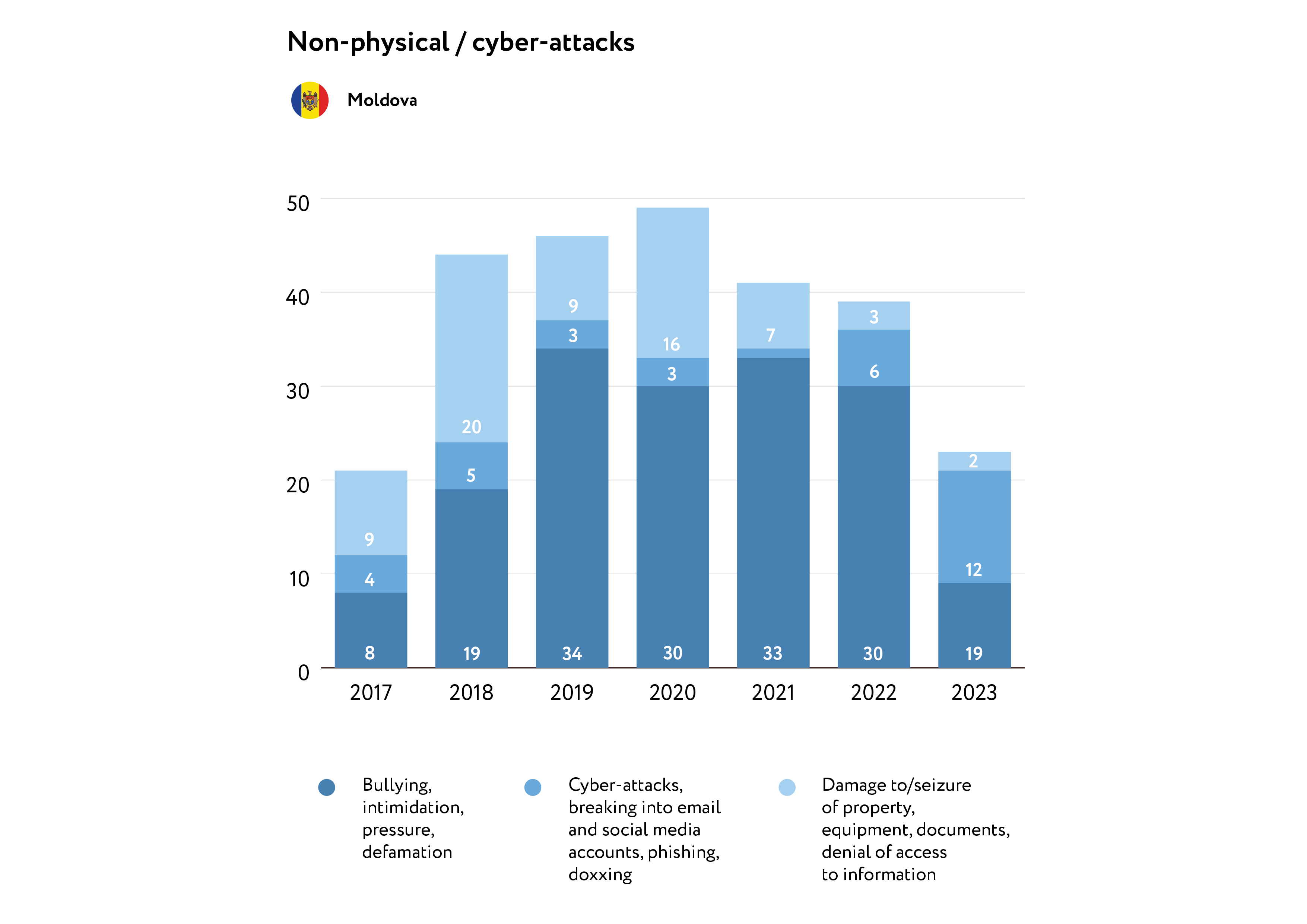
The main methods of non-physical pressure were bullying, intimidation, threats of violence and death, including online threats (19 incidents). These included:
- On 7 February, the Deputy President of the People’s Assembly of the Gagauz Autonomy, L. Kiosea, and two political activists verbally attacked Nokta.md journalist Mihail Sirkeli in a show on the regional public TV station “GRT”. This was in connection with his critical views on the referendum that took place in the Gagauz autonomy in February 2014, which was then declared illegal by the courts of the Republic of Moldova. Guests on the show called Mr Sirkeli “dirty” and said that he promoted “LGBT propaganda” because he “was one of them”.
- On 22 and 24 March, and 9 May, the journalist Viorica Tataru, who filmed the protests organised by the “Shor” political party, was insulted and abused by fake Facebook accounts. These anonymous users called her a “prostitute”, “miserable”, and “Soros’s garbage”.
- On 21 May, the speaker of the People’s Assembly of Gagauzia, Dmitry Konstantinov, refused to answer questions from Nokta.md journalists, calling it a fake media outlet and promised to make sure “nobody reads it”.
- On 27 August, the journalist Vitalie Calugareanu (Jurnal TV) received threats on Facebook, claiming he would be beaten if he posted anything against Russia.
- On 24 October 2023, the journalist Măriuța Nistor was verbally abused after attempting to pose questions to Ion Chicu, a former Prime Minister and current president of the Party of Development and Consolidation of Moldova (PDCM). Chicu called Nistor a “media escort, not a reporter” and called the Ziarul de Gardă newspaper a “media brothel.”
- On 28 December, after the publication of an investigative report, oligarch Ilan Shor verbally abused CU SENS journalists during an online press conference. He used aggressive language and threatened to assault the journalists physically.
Compared to previous years, there has been a significant increase in the number of cyber-attacks, DDoS attacks and other hacking incidents, including phishing and doxing. 12 such incidents were reported in 2023 – the highest number since 2017. A few examples include:
- On 25 September 2023, at least three Moldovan news websites were targeted in DDoS attacks coordinated by pro-Russian hackers. Newsmaker.md, Ziarul de Gardă and Nokta.md were targeted at various times of the day. Newsmaker.md reported that it had managed to defend its website and preserve access to it, while Ziarul de Gardă’s page was unavailable to readers for approximately 20 minutes before technical services restored full access.
- On 21 September, the main page of the TV8.md website was cloned. False information was then published on an identical-looking website.
- On 25 September, a Russian-language message appeared on the Telegram channel “Narodnaya Cyber Armia” (National Cyber Army) announcing their intention to hack the Ziarul de Garda website and news website Nokta.md. Shortly after this message was posted, the news outlet’s website was no longer accessible. The cyber-attack lasted for approximately 20 minutes.
Among other incidents recorded:
- On 16 February, the press centre of the Unified Control Commission refused accreditation to Irina Tabaranu, a journalist from the Zonadesecuritate.md portal. The decision was revised after the intervention of the delegation of the Republic of Moldova, and she received the accreditation on 3 March.
- On 29 June, the mayor of the Costesti village, Vasile Borta, refused to give Ialovenioline.md access to information about meetings and decisions adopted by the local council.
5/ ATTACKS VIA JUDICIAL AND/OR ECONOMIC MEANS
In 2023, seven cases of attacks via judicial and/or economic means were recorded. Since 2020, there has been a decrease in the number of such attacks.
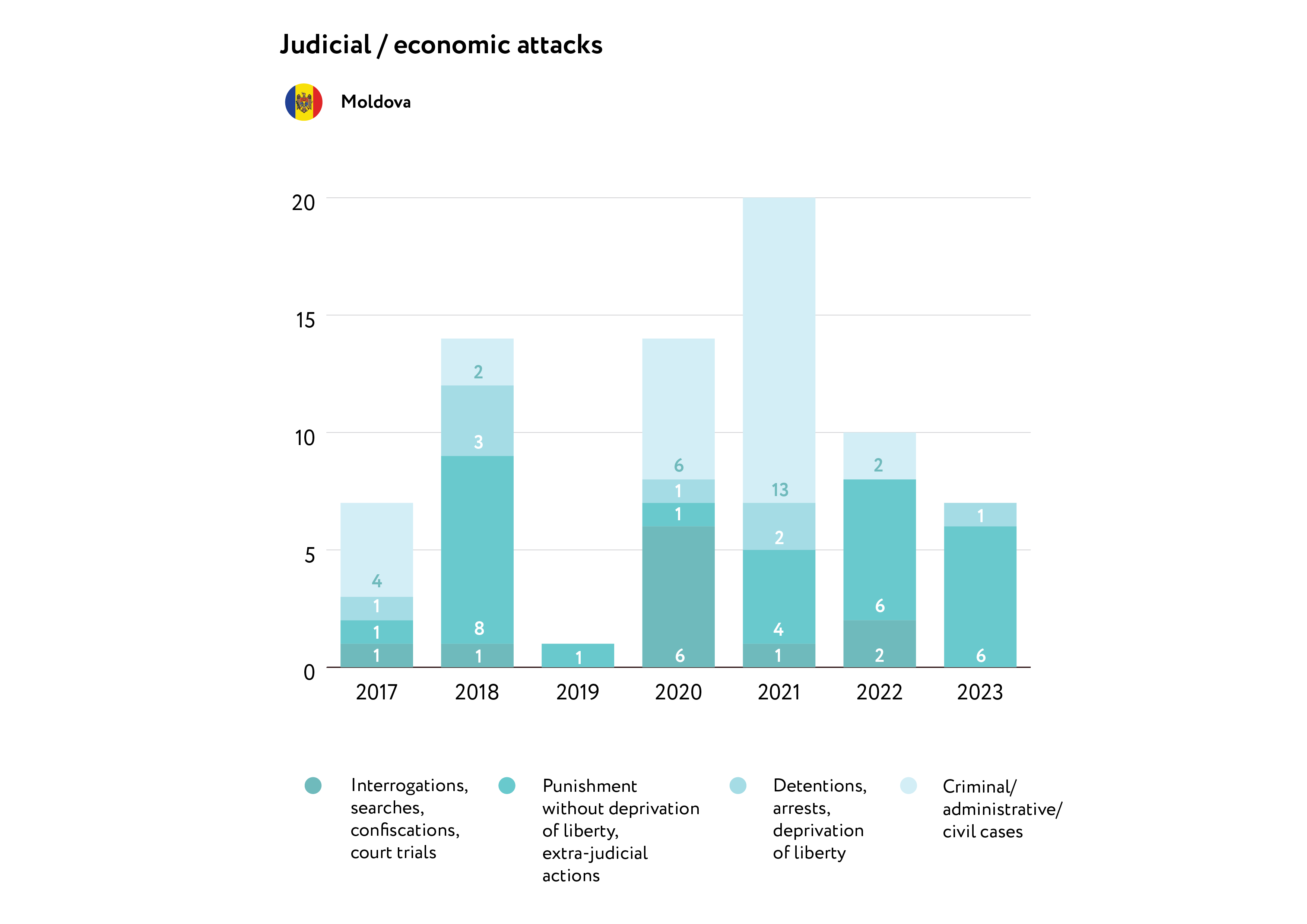
There have been several attacks on journalists declared “undesirable” by the Russian Federation and by unrecognised authorities in the Transnistrian region. Some newsrooms have been involved in civil lawsuits for alleged defamation following the publication of journalistic material. These incidents include:
- On 7 February, Virgiliu Urechi, a doctor and former head of the radiology department of the Chisinau Oncological Institute, who was detained by Moldova’s National Anticorruption Centre for taking bribes in 2022, sent preliminary requests for summons to several newsrooms, claiming that his honour and dignity had been damaged by their publications. He claimed damages of 500,000 Moldovan Leu (25,000 Euro) from the Centre for Investigative Journalism, the Anticoruptie.md and Sanatate.md portals, and 1,000,000 Moldovan Leu (50,000 Euro) from the Ziarul de Gardănewspaper.
- On 18 August, the Russian Federation banned 20 Moldovan citizens from entering its territory, including 18 MPs, the deputy director of the Border Police, and the director of the Association of Independent Press (API) Petru Macovei.
- On 21 September 2023, photojournalist Elena Covalenco was banned from entering the Transnistrian region. Covalenco was informed of the decision during a routine stop at the de facto border while she was travelling with two other journalists from Chisinau to report on a football match in Tiraspol. According to Covalenco, the ban was due to her previous trip to the Transnistrian region in June, during which she was accompanying a journalist for the German broadcaster Deutsche Welle (DW).
- On 3 October 2023, the Russian Federation banned two people from the Republic of Moldova from entering the country, including Liliana Vitu, the chairwoman of the Broadcast Council and Mihal Sirkeli, a journalist from the Nokta.md news portal.
- On 5 October 2023, the ex-deputy director of the Intelligence and Security Service of Moldova, Alexandru Balan, threatened the TV8 media outlet with sanctions, an article claiming he was caught drunk driving and was involved in a road accident. Balan accused journalists of spreading defamation, even though he confirmed the authenticity of the audio recordings published by TV8, in which he appears to be trying to convince the security guard at a local parking garage not to call the police following an accident.
ANNEX 1: OPEN SOURCES USED FOR GATHERING DATA (MOLDOVA)
- Association of Independent Press (API) – a non-commercial organisation that promotes and assists the sustainable development of media organisations and independent journalists at a national and regional level by strengthening professional capacities, increasing resilience and improving public policies in the media field;
- Agora.md – an online Romanian-language news portal;
- Broadcasting Coordinating Council of the Republic of Moldova – a regulatory authority on public and private audiovisual media in Moldova. The CCA (Consiliul Coordonator al Audiovizualului) supervises the enactment of the Broadcasting Code, and issues broadcasting licences and retransmission authorisations;
- Freedom House – an international human rights NGO that evaluates and publishes reports on the level of freedom in 210 countries and territories worldwide, including on freedom of speech and media activity;
- Jurnal.md– an online Romanian-language news portal;
- Institute for Public Policy of Moldova – an independent, nonpartisan and nonprofit organisation, committed to the values of individual liberty, democratic society, rule of law, and free market economy;
- Independent Journalism Centre (CJI) – a non-governmental organisation active in protecting democracy and those who believe in its values;
- National Bureau of Statistics of the Republic of Moldova – a central administrative authority which, as the central statistical body, manages and coordinates activity in the field of statistics in the country;
- Nordnews.md – a regional Romanian-language online news portal (based in the city of Bălți);
- NewsMaker.md – an online Russian and Romanian-language news portal;
- PRO TV Chișinău – a branch of the Romanian television channel in Moldova;
- Reporters Without Borders — an international non-profit and non-governmental organisation with the stated aim of safeguarding the right to freedom of information;
- Rise.md – the internet portal of a group of investigative journalists.
